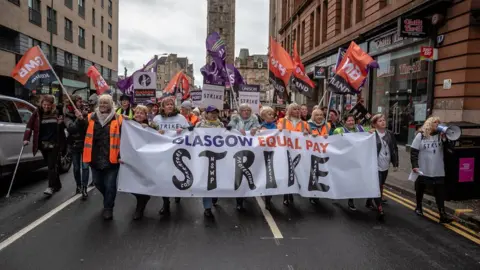'Tough choices ahead' after Glasgow council equal pay deal
 Getty Images
Getty ImagesThe leader of Glasgow City Council has admitted it faces "tough choices" over its services after agreeing a £500m equal pay settlement.
The council aims to pay the bill by borrowing money and mortgaging some of its buildings.
But leader Susan Aitken said servicing these debts would cost the council tens of millions of pounds each year.
She said it would "seek to avoid cuts to frontline services as much as we possibly can".
However, she said people were likely to see differences in the way some council services are delivered.
Thousands of council workers walked out on strike in October as part of the long-running dispute, which centred on women who were paid up to £3 an hour less than male colleagues despite being in the same pay grade.
The issue dated back to 2006 when the previous Labour administration introduced a new job evaluation scheme which was supposed to address pay inequality, but campaigners say instead entrenched the discrimination.
More than 12,000 claims were lodged. The women affected are in line to receive an average of £35,000 each under the settlement that was announced between the council and unions on Thursday.
Resolving the dispute had been a key pledge by Ms Aitken and her SNP colleagues before they won control of the council two years ago.
Speaking to the BBC's Good Morning Scotland programme on Friday, Ms Aitken said the council had a financial strategy in place to pay the estimated £500m bill.
This was mainly based on "raising money off of our property portfolio" as well as borrowing funds, she said.

Ms Aitken said she could not say which buildings would be involved as discussions with potential lenders were ongoing, but stressed that the council's "historic and heritage buildings" - such as the city halls and Kelvingrove Museum - would not be included.
Servicing the debt was expected to cost "in the low tens of millions" each year, she said, adding: "It means that we have some difficult decisions to make.
"Undoubtedly this is going to be tough and it's something that all politicians of all parties are going to have to face up to and take some responsibility for.
"We are going to seek to avoid cuts to frontline services as much as we possibly can - our priority will be to the continuity and the quality of frontline services, particularly the services that our most deprived communities in the city rely on and also local community facilities."
However, she said "service reform" was likely - which would mean "differences in the way that people perhaps see services being delivered, and also perhaps differences in the locations where services are delivered".
Ms Aitken said: "We're working on strategies for that just now, but our priority is that the people of Glasgow will see their services and their facilities protected as much as we possibly can."
